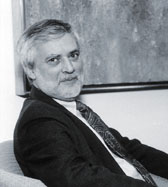
The director of Carnegie Library of Pittsburgh, Bob Croneberger, died on Friday, February 27, due to complications following heart by-pass surgery. His death was a sudden loss to staff and friends of Carnegie Library and Carnegie Museums, and to many Pittsburghers. Beyond Pittsburgh, his loss was felt by the leadership of the national library profession.
Croneberger began his 12 years of service at Carnegie Library in 1986, and during his tenure his strong belief in community partnerships brought many results. He helped establish the Oakland Library Consortium with the University of Pittsburgh and Carnegie Mellon University to maximize resource sharing. He helped create the Electronic Information Network that now links libraries and other information sources throughout Allegheny County, and he worked to secure regular funding for the public library system from the Regional Asset District. Under his leadership the library developed the Martin Luther King, Jr. Reading Center, the Library for the Blind and Physically Handicapped expanded into the Leonard C. Staisey building, and a Friends of the Library program was initiated.
Partnerships with other organizations were plentiful. With Point Park College he worked for five years to create The Library Center, and with the United Way of Allegheny County he established Helpline at the library. The library partnered with Beginning with Books, the Foundation Center, and the Job and Career Education Center. The public library became a home for the Three Rivers Lecture Series, the Pittsburgh Mediation Center, and Calliope: The Pittsburgh Folk Music Society.
Bob Croneberger’s passion for serving the public was constant in his administration. He believed in the library’s mission to improve the lives of the urban poor, and to empower all citizens through free and accessible information. His values were shaped by a strong family tradition of service to others, and he entered a seminary before turning to a classical education and eventually library work. "He chose a secular institution but he brought to it a sacred passion," said the president of the Urban Library Council, Eleanor Jo (Joey) Rodger. Croneberger appreciated, she said, the meaning of the Greek phrase on the ancient library at Alexandria: "House of healing for the soul.’" She added, "Some people are healed with information, some with poetry, and some with finding an old documentÉ." But Croneberger also felt strongly that libraries give people the basic information that empowers them as citizens in a democracy.
That is why Croneberger was such an advocate for public information and intellectual freedom. He served on the accreditation and legislation committees of the American Library Association (ALA). During the challenge to the Communications Decency Act in 1996, ALA and a coalition of organizations asked him to state their position before the U.S. Supreme Court, and he made the case for intellectual freedom in the electronic arena. His testimony was cited three times in the judges’ decision to uphold the availability of free information to the public.
Croneberger helped revitalize the Urban Library Council, a consortium of large metropolitan public libraries, of which he was chair for the past four years. He saw the big picture of libraries in the context of urban infrastructure. "It will make no more difference to provide Internet access to the urban poor if we do not provide the public transportation system to get them to jobs," he said at one national conference.
Bob Croneberger’s legacy in Pittsburgh and Allegheny county is a library system that serves the public through many creative partnerships, and that now has regular support as a regional asset. In the library profession, his advocacy for intellectual freedom helped guide librarians and shape government policies that will affect the new age of electronic information.
-R. Jay Gangewere
Editor, Carnegie Magazine
Contents |
Highlights |
Calendar |
Back Issues |
Museums |